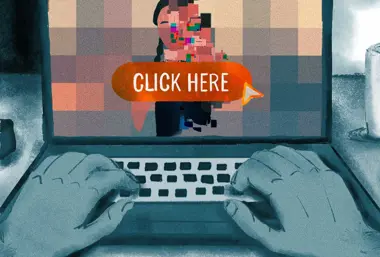
Child sexual abuse material vs ‘child porn’: why language matters
There is No Such Thing as ‘child pornography’.

Published: Tue 9 Aug 2022
Written by: Caroline Allams, Natterhub
The Internet Watch Foundation (IWF) announced in its Annual Report 2021 that “self-generated” content is now the predominant type of child sexual abuse imagery online, with 7-10 year olds the fastest growing age-group of victims. And the first six months of 2022 continue to tell a bleak story with this type of sexual abuse content of 7-10s continuing to rise.
“Self-generated” child sexual abuse is a term used to describe how images and videos of children engaging in sexual activities are captured by someone using a camera on an internet-connected device. Often the child has been groomed and coerced online and the abuser is not physically present. Regardless of how this imagery was created, the IWF is keen to remind everyone that the child is never to blame.
Natterhub has been an IWF Member since August 2020. Natterhub is a gated educational social media platform for primary schools. By teaching students the soft skills that underpin positive digital citizenship, Natterhub teaches pupils to be safe, savvy and kind online. By learning the parameters of how to self-protect in a digital landscape, students can perceive the potential risk of screen-based activity.
In order to protect young people online, it is important to be aware of the latest forms of abuse, despite it being an uncomfortable topic. Educators, parents and caregivers play a critical role in prevention but also as an approachable, trusted adult should a child become embroiled in a situation that doesn’t feel right.
Through the summer break for schools in the UK, when children will be spending more time unaided on devices, it’s important for parents to instigate critical conversations with children in order that they maximise their digital resilience. Adults can sometimes feel ill-equipped to address online safety matters but there are key and surprisingly straightforward actions that can be taken to help mitigate “self-generated” imagery.
Everyone needs to take responsibility for supporting children online.
Normalising discussion about a full range of online experiences with your child(ren) or pupils is an important and effective way for children to explore their thoughts and feelings, as well as to ask questions. Doing this with some regularity gives young people a forum and will help prepare them for any scenarios that break the usual code of conduct.
Every family is different and ultimately it is up to parents to choose how much freedom is granted to their child(ren) in terms of device access and monitoring. Regardless of when and where it happens, children need a clear set of boundaries so they can recognise what is and isn’t appropriate. For example, knowing that they should never put on their camera or share a photograph or video with someone online could help them to avoid coming under an abuser's control.
As part of the curriculum, schools have a requirement to look at online safety and digital citizenship. There is support available for schools to make a real difference at primary-age so that children can become safe, savvy and kind digital citizens. Natterhub is one such solution, offering a unique, scenario-based learning experience. It provides teachers with everything from lesson planning to assessment, all exercised within a safe but realistic environment that really engages pupils. Children can use such a space to develop and practise soft skills, which will be invaluable when they are navigating the digital world alone.
In your role as teacher, parent, caregiver - or combination of both - education is key to preparing children for a future that will largely exist online. To change the course of this worrying trend of self-generated content abuse, action must be taken with some urgency.
On 6 October 2022, at 1900hrs, Natterhub is offering a FREE, virtual Online Safety Parent Workshop. Schools are invited to register an interest in this campaign here in order to receive a link to share with all parents.

There is No Such Thing as ‘child pornography’.